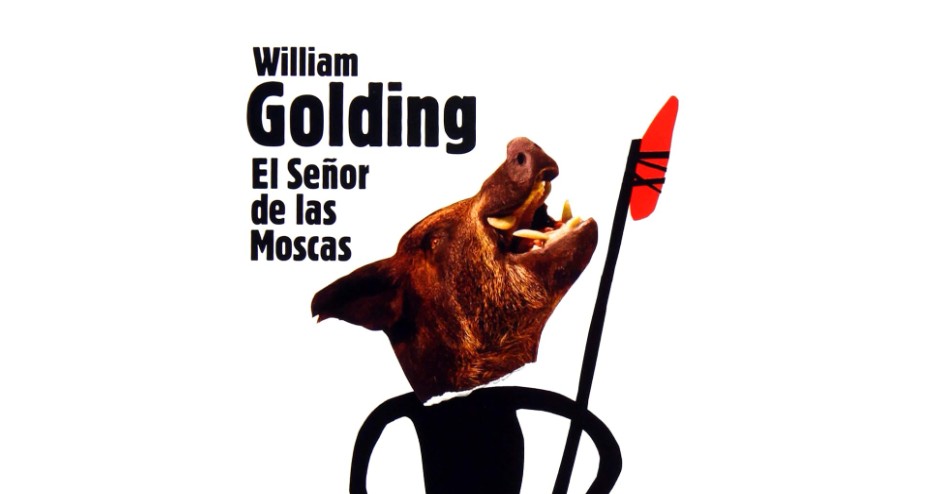- Opinion
- 20 de November de 2025
- No Comment
- 6 minutes read
The Lord of the Flies Revisited

Detail from the cover of William Golding’s book / Image: Alianza Editorial

Víctor Mercado
If there is a glorious age — an age of self-affirmation or self-denial, rich in extreme experiences and other exercises in subjectivation — it is childhood and adolescence. These transitional stages on the way to adulthood have been beatifically idealised by poets, philosophers and mystics, as well as by the counterculture, which sought to invert the Oedipus complex: “the trauma that breaks the child’s paradisiacal symbiosis with the mother and teaches them to live without her, to make do with less”. Hence Simon Reynolds observes that “from the Situationists’ ‘take your desire for reality’ to Jim Morrison’s ‘we want the world and we want it NOW’, the anti-Oedipal impetus of the late sixties was at once poetic and psychotic”. A reclamation of the mother, and with her, the return to paradise. As if paradise — or society itself — were conceivable without the castrating limit imposed on the self in its dialectical identification with the other. As if, in the child as in the adult, the other were not also a kind of temptation to — as Freud puts it — “satisfy one’s aggressiveness, to exploit another’s capacity for work without remuneration, to take sexual advantage of them without their consent, to appropriate their goods, to humiliate them, to cause them suffering, to torture and to kill them”.
A fine example of this rich mosaic of horrors — one that puts Rousseau’s theory of “le bon sauvage” (the noble savage) to the test — is The Lord of the Flies by William Golding, a classic that has withstood the test of time while putting our own time to the test: an age in which so many limits are being undone. The story is well known: following a plane crash, a group of boys from a British military school must organise their lives on a deserted island without adults. But friction soon arises between those who will represent civilisation and those who will embody barbarism; and in this Hobbesian war of all against all, the horror vacui born of fear and the absence of Law spreads across the Edenic island like a dark stain, provoking a Voltairean laugh. Rousseau — unlike Voltaire, who had a far less naïve view of human nature — believed that human beings untouched by Western civilisation lived in a state of semi-divine grace, under a non-repressive principle of reality that could fit beneath a fig leaf. But alas, even those fig leaves seem unwilling to agree with Rousseau; for the first inhabitants of a supposed non-repressive order are precisely the proof that, even when the pleasure principle need not be replaced by the reality principle, evil still persists within us — as the Greek concept of hybris also teaches.
The Lord of the Flies, epithet of Beelzebub, is evil incarnate in the thousand flies that buzz around the head of a slaughtered boar mounted on a stick in the hunters’ jungle clearing. That head also symbolises human barbarism, the catastrophe of culture, a pre-historic — even sub-human — past; the Dionysian bestiality unchained: all that had to be suppressed in order to guarantee civilisation. Written in 1954, with the terror of the Second World War still smouldering, the novel stands as an allegory of that violence which would forever leave its mark on the generations to come. Another emblem worth noting is the conch shell. Whoever holds it has the right to speak without interruption from the others. It represents unity and order — the very qualities that, for some time now, have been vanishing from our secondary classrooms. In this sense, the film version, remarkably faithful to Golding’s novel, is more than recommended viewing — especially for first-year students of compulsory secondary education.
On 6 November, the International Day Against Violence and Bullying at School, I read that the Minister of Education had declared on social media that “classrooms must always be safe spaces for boys and girls”. And I thought to myself: easier said than done. If insulting or hitting a teacher goes unpunished — particularly when teachers are not recognised as public authorities, as is the case in Catalonia but also in other regions — how much, then, will it cost to insult or strike a classmate? Should we really be surprised that schools are not safe environments? Today, families are taking to the streets to make their voices heard, demanding a law. Yet we must also acknowledge that, generation after generation — since that Sixty-Eighter cohort raised under peculiarly lax educational values (as Theodore Roszak noted) — the very consistency of the “notion of the father,” which allows one to distinguish between two distinct lineages, has grown ever weaker. Hence the need to ask ourselves what it means to be a father — and, incidentally and above all, what it means to educate.
Source: educational EVIDENCE
Rights: Creative Commons

